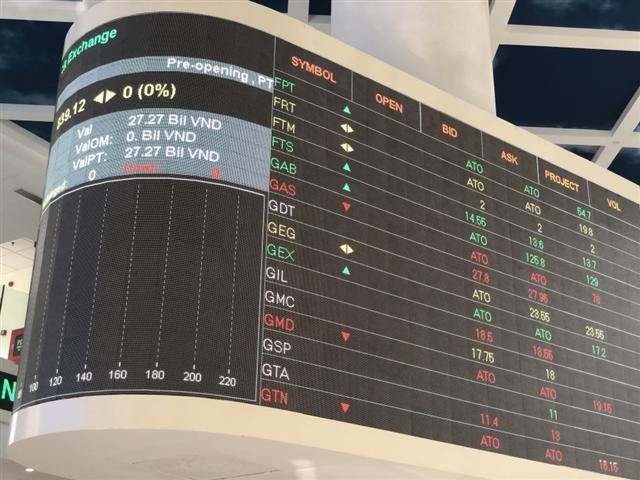SBV mulls proposal to increase credit limit for securities
SBV mulls proposal to increase credit limit for securities
The Ministry of Finance has proposed that the State Bank of Vietnam (SBV) increase credit limits for the securities industry and allow the listing of foreign-invested enterprises on the stock market. Increasing the credit limit for securities will help increase purchasing power and bolster the market.
|
Increasing credit limit
According to Circular 36/2014/TT-NHNN, commercial banks and branches of foreign banks will be entitled to extend credit only in the form of lending and discounting stocks in order to serve stock investment and business if the bad debt ratio remains below three percent. In addition, Article 14 of Circular 36/2014/TT-NHNN also stipulates that total outstanding credit that commercial banks and branches of foreign banks extend to clients for the purpose of stock investment and business is not allowed to exceed five percent of chartered capital and allocated capital of commercial banks and branches of foreign banks.
According to the State Securities Commission, credit that banks use to finance securities companies for margin lending remains at a relatively low level, standing at around VND30.5 trillion, accounting for about 0.37 percent of total outstanding loans of the banking system.
Therefore, if the proposal is approved, securities companies will have more money to lend investors for margin trading.
Easing loan terms
According to the State Securities Commission, total margin lending reached an estimated VND50 trillion in the first quarter of the year, a drop of 14 percent compared to the beginning of the year. Almost all securities companies saw a decline in margin lending, as worries about the Covid-19 pandemic slowed trading.
Phan Dung Khanh, investment advisory director of the Maybank Kim Eng Securities Company, said margin trading is subjected to a number of restrictions. For example, total margin lending at a securities company to a single customer must not exceed three percent of the lender’s equity. As margin lending has a maximum term of three months, with an additional three-month extension, it often forces investors to sell securities to pay debts when the loan maturity expired.
Capital flows from securities companies utilized for margin lending, including both equity and bank loans, play an important role for investors and the stock market. In addition, investors’ awareness of margin trading has been enhanced and the risk control system of securities companies has been improved significantly, thus the bad debt ratio arising from securities lending remains at a very low level.
Therefore, if the proposal to increase the credit limit for securities is approved, the stock market credit source will grow and create new sources of money to support investors in the short- and long-term. The demand for loans from securities companies is quite large, but as securities are considered a risky sector, many commercial banks are hesitant to lend to them, especially when companies often do not have collateral.
In addition to increasing the credit limit, there should be solutions to boost investor participation in the market.
| The Ministry of Finance is devising solutions to support businesses affected by the Covid-19 pandemic and restart the economy. These include postponing annual shareholder general meetings by three months, up to September 30, 2020; reducing the disclosure time of treasury stock transactions to 1-2 days; allowing stock market listing of foreign-invested enterprises; and increasing the securities industry credit limit, of which the quota does not exceed five percent of the bank’s chartered capital. |
























